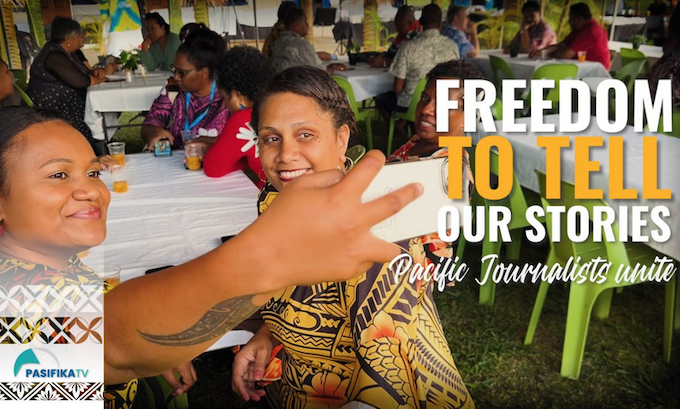
By Michelle Curran of Pasifika TV
World Press Freedom Day is a poignant reminder that journalists and media workers are essential for a healthy, functioning society — including the Pacific.
Held annually on May 3, World Press Freedom Day prompts governments about the need to respect press freedom, while serving as a day of reflection among media professionals about issues of press freedom and professional ethics.
Just as importantly, World Press Freedom Day is a day of support for media which are targets for the restraint, or abolition, of press freedom.
- READ MORE: New deal for journalism – RSF’s 11 steps to ‘reconstruct’ global media
- Rabuka salutes Fiji media but warns against taking freedom for granted
- NZ fares well in latest RSF press freedom index as authoritarian regimes stifle Asia-Pacific media
- RSF 2025 World Press Freedom rankings
- RSF World Press Freedom Index 2025: economic fragility a leading threat to press freedom
It is also a day of remembrance for those journalists who lost their lives in the pursuit of a story.
According to Reporters Without Borders, the press freedom situation has worsened in the Asia-Pacific region, where 26 of the 32 countries and territories have seen their scores fall in the 2024 World Press Freedom Index.
The region’s dictatorial governments have been tightening their hold over news and information with increasing vigour.
No country in the Asia-Pacific region is among the Index’s top 15 this year, with Aotearoa New Zealand falling six places to 19. [Editor’s note: these figures are outdated — from last year’s 2024 Index. Go to the 2025 index here).
Although experiencing challenges to the right to information, other regional democracies such as Timor-Leste (20th), Samoa (22nd) and Taiwan (27th) have also retained their roles as press freedom models.
Storytelling a vital art
Storytelling is inherent in Pacific peoples, and it is vital this art is nurtured, and our narrative is heard loud and clear — a priority goal for Pacific Cooperation Broadcasting Limited (PCBL) and Pasifika TV.
Chief executive officer of PCBL Natasha Meleisea says Pacific-led storytelling is critical to regional identity, but like all media around the world, it faces all sorts of challenges and issues.
“Some of those current concerns include the need for journalism to remain independent, as well as the constructive use of technology, notably AI and that it supports the truth and does not undermine it,” Meleisea said.
Forums such as the Pacific Media Summit are critical to addressing, and finding a collective response to the various challenges, she added.
At the biennial Pacific Media Summit, staged last year in Niue, the theme centred around Pacific media’s navigation of press freedom, AI and geopolitical interests, and the need to pave a resilient pathway forward.
Resilient media sector
Meleisea said some solutions to these issues were being implemented, to provide a resilient and sustainable media sector in the Pacific.
“It is a matter of getting creative, and looking at alternative platforms for content, as well as seeking international funding and building an infrastructure which supports these new goals,” she says.
“There is no doubt journalists and media workers are essential for a healthy, functioning society and when done right, journalism can hold those in power to account, amplify underrepresented stories, bolster democratic ideals, and spread crucial information to the public.
“With press freedom increasingly under threat, we must protect Pacific story sovereignty, and our voice at the table.”
Republished from Pasifika TV strategic communications.













































